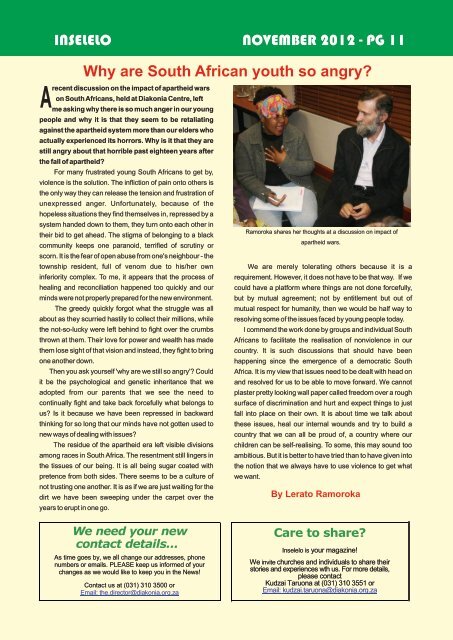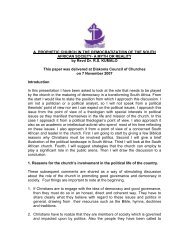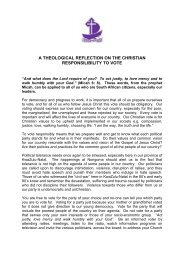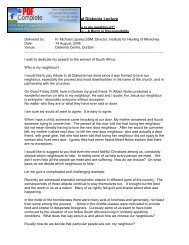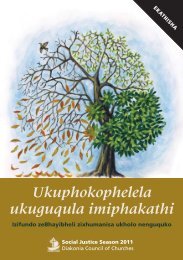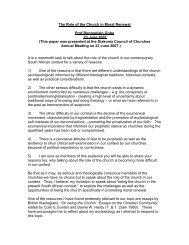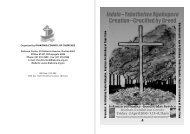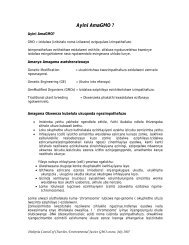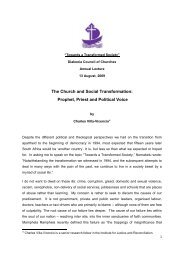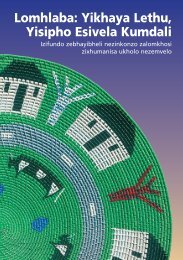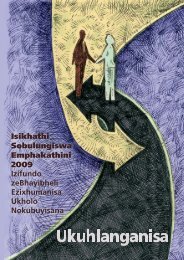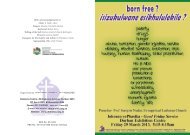Inselelo November 2012 - Diakonia Council of Churches
Inselelo November 2012 - Diakonia Council of Churches
Inselelo November 2012 - Diakonia Council of Churches
- No tags were found...
Create successful ePaper yourself
Turn your PDF publications into a flip-book with our unique Google optimized e-Paper software.
INSELELO NOVEMBER <strong>2012</strong> - PG 11Why are South African youth so angry?Arecent discussion on the impact <strong>of</strong> apartheid warson South Africans, held at <strong>Diakonia</strong> Centre, leftme asking why there is so much anger in our youngpeople and why it is that they seem to be retaliatingagainst the apartheid system more than our elders whoactually experienced its horrors. Why is it that they arestill angry about that horrible past eighteen years afterthe fall <strong>of</strong> apartheid?For many frustrated young South Africans to get by,violence is the solution. The infliction <strong>of</strong> pain onto others isthe only way they can release the tension and frustration <strong>of</strong>unexpressed anger. Unfortunately, because <strong>of</strong> thehopeless situations they find themselves in, repressed by asystem handed down to them, they turn onto each other intheir bid to get ahead. The stigma <strong>of</strong> belonging to a blackcommunity keeps one paranoid, terrified <strong>of</strong> scrutiny orscorn. It is the fear <strong>of</strong> open abuse from one's neighbour - thetownship resident, full <strong>of</strong> venom due to his/her owninferiority complex. To me, it appears that the process <strong>of</strong>healing and reconciliation happened too quickly and ourminds were not properly prepared for the new environment.The greedy quickly forgot what the struggle was allabout as they scurried hastily to collect their millions, whilethe not-so-lucky were left behind to fight over the crumbsthrown at them. Their love for power and wealth has madethem lose sight <strong>of</strong> that vision and instead, they fight to bringone another down.Then you ask yourself 'why are we still so angry'? Couldit be the psychological and genetic inheritance that weadopted from our parents that we see the need tocontinually fight and take back forcefully what belongs tous? Is it because we have been repressed in backwardthinking for so long that our minds have not gotten used tonew ways <strong>of</strong> dealing with issues?The residue <strong>of</strong> the apartheid era left visible divisionsamong races in South Africa. The resentment still lingers inthe tissues <strong>of</strong> our being. It is all being sugar coated withpretence from both sides. There seems to be a culture <strong>of</strong>not trusting one another. It is as if we are just waiting for thedirt we have been sweeping under the carpet over theyears to erupt in one go.Ramoroka shares her thoughts at a discussion on impact <strong>of</strong>apartheid wars.We are merely tolerating others because it is arequirement. However, it does not have to be that way. If wecould have a platform where things are not done forcefully,but by mutual agreement; not by entitlement but out <strong>of</strong>mutual respect for humanity, then we would be half way toresolving some <strong>of</strong> the issues faced by young people today.I commend the work done by groups and individual SouthAfricans to facilitate the realisation <strong>of</strong> nonviolence in ourcountry. It is such discussions that should have beenhappening since the emergence <strong>of</strong> a democratic SouthAfrica. It is my view that issues need to be dealt with head onand resolved for us to be able to move forward. We cannotplaster pretty looking wall paper called freedom over a roughsurface <strong>of</strong> discrimination and hurt and expect things to justfall into place on their own. It is about time we talk aboutthese issues, heal our internal wounds and try to build acountry that we can all be proud <strong>of</strong>, a country where ourchildren can be self-realising. To some, this may sound tooambitious. But it is better to have tried than to have given intothe notion that we always have to use violence to get whatwe want.By Lerato RamorokaWe need your newcontact details...As time goes by, we all change our addresses, phonenumbers or emails. PLEASE keep us informed <strong>of</strong> yourchanges as we would like to keep you in the News!Contact us at (031) 310 3500 orEmail: the.director@diakonia.org.zaCare to share?<strong>Inselelo</strong> is your magazine!We invite churches and individuals to share theirstories and experiences wth us. For more details,please contactKudzai Taruona at (031) 310 3551 orEmail: kudzai.taruona@diakonia.org.za


